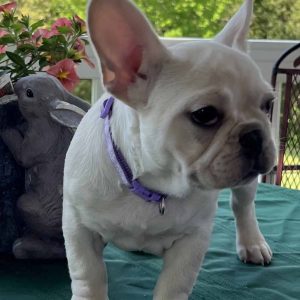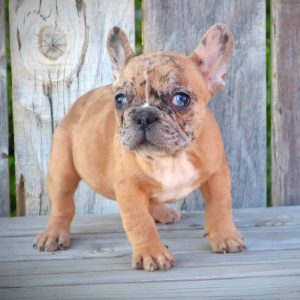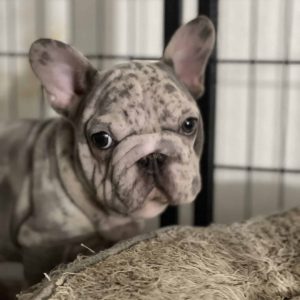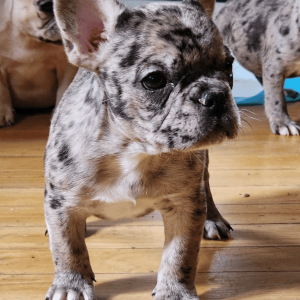French Bulldog
Showing 1–16 of 31 results

The French Bulldog or Frenchie is one of a kind, both in appearance and in personality. These bat-eared little charmers are some of the most popular urban dogs in the world today. They’re great for both experienced dog owners and novices alike.
While they’re not a traditionally beautiful breed, French Bulldogs have a unique appeal. They’re similar in appearance to the Bulldog, but scaled down to a size that makes them ideal for apartment living. They get along well with almost all humans and most animals with their easygoing nature.
Temperament
French Bulldogs are almost always outgoing and ready to play at a moment’s notice. These small dogs are rarely shy, and are generally friendly towards everyone they meet. They can be lazy from time to time, and enjoy lounging around the house. They may sometimes need encouragement to actually go out and exercise. In general, they enjoy outdoor activities with both humans and other dogs. Some French Bulldogs may be tenacious or strong-willed due to their Bulldog heritage. They are stronger than their size would indicate, and they may run headlong into objects or people when they get excited. Despite this, most French Bulldogs are not aggressive in the slightest, and are exceedingly gentle when they’re calm. As a companion dog, French Bulldogs bond very strongly with their owners and will not enjoy being left alone for long periods of time.-

AKC CH line Frenchie female
-

AKC female black and tan French bulldog
-

AKC French Bulldog Puppies
-

AKC French Bulldog Puppies Born Sept 26 2023
-

AKC FRENCH BULLDOG PUPPIES MERLE ISABELLA FRENCHIE
-

Akc French Bulldogs
-

Big Rope French Bulldogs available
-

Chip and Dale
-

Dior….AKC Frenchie Puppy
-

Exotic Frenchies
-

Fendi….AKC Frenchie
-

French Bulldog
-

FRENCH BULLDOG
-

French Bulldog
-

French Bulldog Female AKC Pet Quality
-

French Bulldog Puppies
The Ultimate Guide to French Bulldog
Origins
The origins of the French Bulldog can actually be traced back to England, where the breed began in the 19th century. The larger English Bulldog was crossbred with other dogs to create the Toy Bulldog. This now-extinct breed was in turn bred with terriers to create a smaller companion dog. The resulting breed wound up being popular with lacemakers in the English Midlands. When these lace workers emigrated to Normandy, France, for better opportunities, they took their dogs with them. Eventually some of these dogs were brought to Paris, where they became an instant hit. By the early 20th century, French Bulldogs had been brought over to America, where they also found success. Dog lovers in high society were enamored with the French Bulldog. Though their popularity has risen and fallen over the years, French Bulldogs are still one of the top dog breeds today.
Key Characteristics of French Bulldog
| French Bulldog | French Bulldogs are almost always outgoing and ready to play at a moment’s notice. These small dogs are rarely shy, and are generally friendly towards everyone they meet. They can be lazy from time to time, and enjoy lounging around the house. They may sometimes need encouragement to actually go out and exercise. In general, they enjoy outdoor activities with both humans and other dogs.
Some French Bulldogs may be tenacious or strong-willed due to their Bulldog heritage. They are stronger than their size would indicate, and they may run headlong into objects or people when they get excited. Despite this, most French Bulldogs are not aggressive in the slightest, and are exceedingly gentle when they’re calm. As a companion dog, French Bulldogs bond very strongly with their owners and will not enjoy being left alone for long periods of time. |
| Exercise Needs | French Bulldogs are not usually considered a high-energy breed, but that’s mainly because they lack stamina for long play sessions. They have the strength and agility to run around at high speed and jump all over obstacles, but can only do so for a short while. These short bursts of energy are a common experience with French Bulldogs, even with older dogs.
While all dogs benefit from regular exercise, special care needs to be taken with the French Bulldog. Their short faces mean that they do not breathe as well as other dogs, and they can overheat quickly in hotter temperatures. Walks lasting 10 to 15 minutes are enough for most French Bulldogs, and a couple of these sessions per day during cooler hours should suffice. Once the temperature goes above 80 degrees, a French Bulldog should be watched for any signs of heat exhaustion. |
| French Bulldog Grooming | French Bulldogs are generally low-maintenance dogs, and do not require frequent bathing. Their coat is short and fine, and only sheds minimally. Weekly brushing is recommended for most French Bulldogs to remove shed fur and dander, preferably using a brush with medium bristles.
The area where French Bulldogs need some extra attention is around their face and ears. Due to the numerous folds on the facial skin, French Bulldogs are prone to infections in the area. Hypoallergenic wipes may be used to clean between the folds, and the face should be inspected regularly for any bumps, rashes, or other signs of skin infection. Once the face is wiped, a clean towel should be used to dry off the skin and prevent irritation.
Bathing a French Bulldog does not need to happen very often. Bathing too often can dry out the skin by stripping it of the natural oils that keep it moist. If you do bathe your French Bulldog, high-quality dog shampoo is advisable. The ears should be cleaned regularly with a warm damp cloth, wiping around the edge of the ear canal.
The nails of the French Bulldog are not worn down very often due to their low activity level, so they will need to be trimmed more often than other dogs. Tooth brushing can be done two or three times a week, but daily tooth brushing is ideal. |
| French Bulldog Training | The key to successfully training a French Bulldog is to start early. French Bulldogs have a reputation for being stubborn and difficult to train, but that’s mostly down to them being distracted or having their own way of doing things. Most French Bulldogs are reasonably intelligent and have good problem-solving skills, the challenge simply lies in directing this intelligence to the task at hand.
A French Bulldog owner will need to begin with obedience training early to get the best results. Being patient and consistent with training will result in a French Bulldog that is well-behaved and gentle towards other dogs and strangers. Positive reinforcement is usually the best method of rewarding a French Bulldog, as they are sensitive and do not enjoy harsh rebukes. Just be careful of giving them too many treats as a reward, as they may be prone to weight gain. |
| French Bulldog Lifespan and Health Issues | French Bulldogs can normally live up to 11 to 14 years of age. French Bulldogs may be prone to:
|
| French Bulldog Size and Space Requirements | French Bulldogs are a medium-to-small sized breed, standing at 11 to 13 inches at the shoulder. Most French Bulldogs will normally weigh between 20 to 28 pounds, though some may weigh more than that.
The size of the French Bulldog means that they can adapt to most homes, whether in cities or rural areas. However, they are not suited to being outdoor dogs, and heat may be a concern for their health. They thrive on contact with people, and will want to be close to their owners most of the time. While they enjoy the outdoors for play, they will want to come back inside the house to relax and nap for most of the day. |
Other considerations:
- French Bulldogs are not good at swimming, and should never be left unattended in any body of water. Their front-heavy bodies mean that they have trouble keeping their heads above water and tend to sink face-down. Some French Bulldog owners have had success with dog floatation devices, but it’s best to use these as a precaution, rather than a way for the dog to swim.
- French Bulldogs are not very vocal dogs, but are protective of their family members.
- They get along well with children but their strength and weight may result in inadvertent injury if they get too excited. Any interaction between a French Bulldog and children under 6 years old should be supervised.
How can I take good care of my French Bulldog or Puppy?
Proper socialization
A French Bulldog puppy should be socialized soon after being brought home to expose them to the various people and objects they will encounter in their day-to-day life. Most breeders will release puppies to their new owners at 8 weeks old, and this 8 to 12 weeks of age is when puppies are most receptive to new stimuli.
Proper nutrition
It’s important to get a French Bulldog puppy high-quality, premium dog food so that they develop properly. Since French Bulldogs are prone to weight gain, weighing out your puppy’s meals is advisable. Multiple small meals per day will help prevent overeating and indigestion. Any treats should only be given in moderation, as most treats will be loaded with fat and carbohydrates. If you have any concerns about your French Bulldog puppy’s weight, diet, or appetite, your veterinarian may have more specific dietary recommendations.
Up-to-date vaccinations
Like most other dog breeds, French Bulldog puppies should not be allowed to interact closely with other dogs until their vaccinations are complete at 14 to 16 weeks. Once you bring home your French Bulldog puppies, contact your veterinarian for advice regarding their vaccination schedule. Follow the schedule your veterinarian gives you to ensure that your French Bulldog is adequately protected from common transmissible diseases.
Most Asked French Bulldog Questions
-
+How Much do French Bulldog Puppies Cost